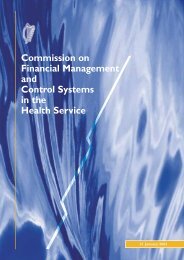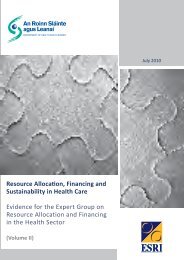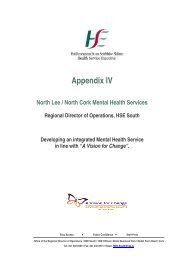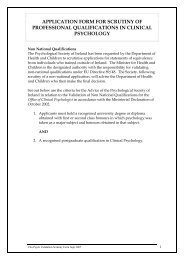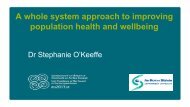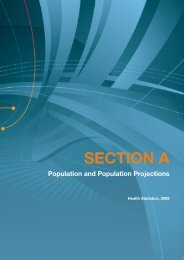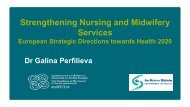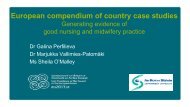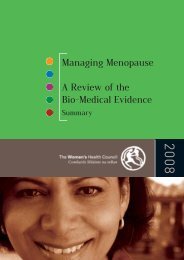All Ireland Traveller Health Study Our Geels - Department of Health ...
All Ireland Traveller Health Study Our Geels - Department of Health ...
All Ireland Traveller Health Study Our Geels - Department of Health ...
You also want an ePaper? Increase the reach of your titles
YUMPU automatically turns print PDFs into web optimized ePapers that Google loves.
<strong>Health</strong> Survey Findings<br />
Peer Researchers, Coordinators and Fieldwork Training<br />
Pavee Point identified that 40+ Primary <strong>Health</strong>care for <strong>Traveller</strong> Projects, which included approx 320<br />
TCHWs and 40 project coordinators who had received training in basic research methods, would be<br />
available to the study as enumerators. <strong>All</strong> enumerators were trained to a standardised level. This had<br />
many advantages over using enumerators from outside the <strong>Traveller</strong> community (e.g. Local Authority<br />
Social Workers or Housing Welfare Officers), both in terms <strong>of</strong> their acceptability to <strong>Traveller</strong>s, and also<br />
their local knowledge <strong>of</strong> where <strong>Traveller</strong>s lived in the region.<br />
The training for the study was delivered by the UCD team as a Trainer’s Training Course to coordinators<br />
and assistant coordinators <strong>of</strong> the projects, who in turn provided that training to the TCHWs in their<br />
teams. The PHCTP coordinators coordinated the work <strong>of</strong> their PHCTP teams locally and also acted<br />
as the key link and resource to the study team. In areas where there were no PHCTPs the regional<br />
networks covered the area with CHWs who had contact in these areas. Where this was not possible and<br />
while conducting the census in the regions they made contact with key informants, i.e. other <strong>Traveller</strong><br />
organisations or projects, visiting teachers, PHNs and <strong>Traveller</strong> Training Centres.<br />
The initial coordinators targeted were the existing coordinators in the Primary <strong>Health</strong>care for<br />
<strong>Traveller</strong> Projects; these projects normally have two coordinators in place, one representing the HSE<br />
perspective (PHN or RGN) and one representing the <strong>Traveller</strong> organisation perspective (Community<br />
Development Worker). At the beginning <strong>of</strong> the study there were 40 <strong>of</strong> these projects in the country<br />
and approximately an additional 6 Projects in development as PHCTPs. Some <strong>of</strong> the projects were<br />
supported by the local THU to facilitate their participation in the study.<br />
In areas <strong>of</strong> the country where there was no PHCTP, the study team worked with co-ordinators identified<br />
through <strong>Traveller</strong> organisations/<strong>Traveller</strong> Community Development Projects (CDPs). Where there<br />
was an identifiable <strong>Traveller</strong> organisation, <strong>Traveller</strong> Training Centres were used (<strong>of</strong> which there were<br />
approximately 40 in ROI). Where there was an absence <strong>of</strong> all these <strong>Traveller</strong> structures, community<br />
development organisations were used (e.g. external employment <strong>of</strong> some <strong>of</strong> the Community<br />
Development workers in the North Eastern region).<br />
The coordinators were facilitated by their employers in the HSE, FAS, <strong>Traveller</strong> Training Centres,<br />
Community Development Projects and <strong>Traveller</strong> organisations to attend the training days. The training<br />
costs, travel and accommodation were funded by the UCD study team.<br />
85 coordinators and assistant coordinators were trained to act as study coordinators and trainers in<br />
Northern <strong>Ireland</strong> and the Republic <strong>of</strong> <strong>Ireland</strong>. These study coordinators and trainers then trained 400<br />
<strong>Traveller</strong>s at local level to act as Peer Researchers for the study.<br />
Six training days were held with study co-ordinators extending from 12th March to 9th September,<br />
2008. The training was iterative and linked to the development <strong>of</strong> the study instruments and protocols.<br />
Each session was evaluated and feedback used to inform further training. Time was allowed between<br />
57



